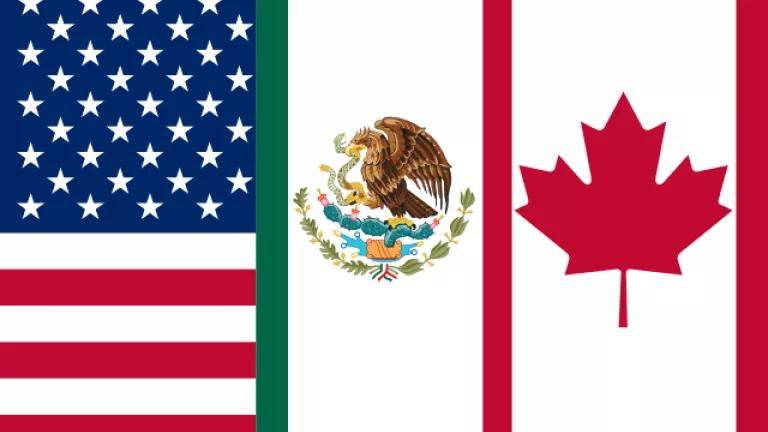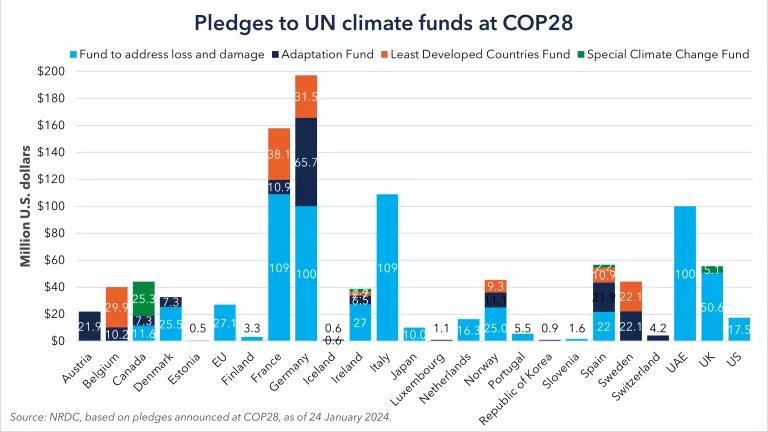New NAFTA Must Address Climate Change

Improving the North American Free Trade Agreement (NAFTA) has been one of President Donald Trump’s key priorities, and, unlike much of what the Trump administration has tried to do, one goal the Natural Resources Defense Council has shared. The 25-year-old agreement needs updating, notably on environment and labor issues. For that reason, NRDC and other groups welcomed the opportunity to correct NAFTA’s failings, and in 2017 made recommendations to the administration on how to do so. Unfortunately, the revised trade agreement, still falls short of basic environmental criteria that any 21st Century trade agreement must include to be relevant and effective.
NRDC joined a broad coalition of environmental groups in 2018 to reiterate three baseline environmental criteria for updating NAFTA:
- Address climate change
- Eliminate investor-state dispute settlement
- Strengthen environmental standards and enforcement
While the new agreement, renamed the United States-Mexico-Canada Agreement (USMCA), does make some important improvements over the current NAFTA, it still fails the test for what should be a modern, pro-environment trade deal. Most concerningly, the agreement completely ignores climate change. The greatest environmental challenge of the 21st Century cannot be ignored by 21st Century trade agreements.
Trump now needs Congress to approve the USMCA. While senators and representatives consider the agreement, NRDC both recognizes the gains that have been made, yet urges them not to approve the revised text as it is currently written. Doing so could set a dangerous precedent for future agreements.
Modern trade agreements must address climate change.
When NAFTA came into force in 1994, it was one of the first major multilateral trade agreements in the world and became a model for subsequent U.S. free trade agreements. Since then, the U.S. has entered free-trade deals with 20 countries, and global trade has more than tripled.
But over that time the climate problem has also gotten much more serious. Since 1994, annual global carbon emissions have increased by more than 60 percent. The world came together in Paris in 2015 to adopt an international climate agreement to reduce global emissions. Unfortunately, the Trump administration has promised to withdraw from the Paris Accord, and it can formally initiate that process to do so in November 2019. And in Mexico, the new president is pushing policies to promote fossil fuels that will certainly lead to increased carbon emissions.
A trade deal that ignores the urgent threat of climate change is a non-starter. The USMCA should be reworked to include a mandatory "climate impact test," requiring governments to weigh and report the potential climate impacts of policy proposals. It could also have binding climate standards to hold trading partners accountable to their commitments to emissions reduction either through an independent panel or border carbon adjustments. Border carbon adjustments have bipartisan appeal and support from labor and should be explored in more detail by Congress. In addition, Mexico needs to reverse course on the new administration’s current support for fossil fuels at the expense of clean energy and reaffirm its climate commitments through political action.
ISDS must be eliminated completely.
The Investor-State Dispute Settlement (ISDS) mechanism allows multinational corporations to bypass courts and sue countries for environmental and public health protections that they believe adversely affect their business. Corporations have used NAFTA to challenge bans on toxic chemicals, decisions of environmental review panels, and protections for our climate. They have extracted more than $370 million from governments in these cases, and pending NAFTA claims total more than $50 billion. ISDS represents a giant loophole for companies to go around in-country environment and labor protections at the taxpayers’ expense and should be eliminated completely.
The revised NAFTA makes significant improvements on ISDS. Among other things, ISDS between the U.S. and Canada will be eliminated three years after the USMCA comes into force. ISDS in Mexico is limited in scope to five economic sectors. Unfortunately, the sectors that will still get ISDS include energy, transportation, and infrastructure—the most polluting sectors.
Environmental standards and enforcement must be strengthened.
The USMCA’s Environment Chapter is included within the treaty’s core text (unlike NAFTA), and it includes some improvements from NAFTA in areas to combat trafficking in wildlife, timber, and fish (e.g. Article 24.22 contains language similar to the Lacey Act). It encourages sustainable forest management. It also addresses air quality and marine litter for the first time in a U.S. trade agreement. These changes are a good start for any further negotiations or future agreements.
But USMCA also backslides on environmental protections by failing to reinforce a standard set of seven Multilateral Environmental Agreements (MEAs) that have been included in recent U.S. trade deals. It includes standard enforcement language for only one of the seven MEAs (Convention on International Trade in Endangered Species of Wild Fauna and Flora), uses weaker language for two MEAs (Montreal Protocol on Ozone Depleting Substances and Convention on Marine Pollution) and fails to mention the other four (Inter-American Tropical Tuna Convention, Ramsar Convention on Wetlands, International Convention of the Regulation of Whaling, Convention on Conservation of Antarctic Marine Living Resources).
We are also concerned about the reality that the U.S. has never brought a trade case against any country for failing to meet environmental obligations, despite clear violations. In January, after getting pressure from House Democrats to act, Robert Lighthizer, the U.S. Trade Representative, did request consultation with Peru over Amazon rainforest deforestation. This action marked the first time the U.S. has initiated an enforcement process on an environmental provision from a free trade agreement. Yet it came after years of evidence that Peru was not implementing environmental provisions in the U.S.-Peru agreement. Simply put, the environment cannot wait that long for help. New trade agreements like the USMCA must include clear mechanisms that automatically trigger an enforcement process when one of the parties violates its environmental sections.
What is next?
For these reasons, the NAFTA renegotiation represents a missed opportunity by the Trump administration. While the USMCA makes some noteworthy improvements over the original NAFTA, the net result is a trade agreement that fails to protect people and the planet. Congress should not approve it as it is currently written, especially because it has the power to shape the agreement further.
For more information about what could happen in Congress, check out NRDC’s other blog.



